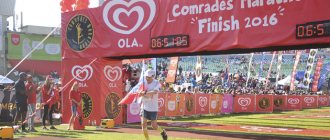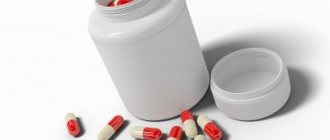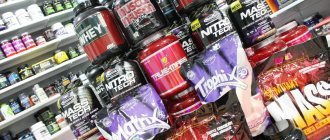Sports nutrition for endurance – Creatine, Beta-alanine, Sodium phosphate
It's best to start with one of the most popular and well-known supplements for most strength sports. Thousands of studies have proven its effectiveness. Of course, we are talking about creatine monohydrate. You can often come across the misconception that creatine is taken solely to increase strength. Moreover, during aerobic exercise it is customary to completely exclude it from the list of supplements used. However, creatine is also extremely useful for increasing endurance. Its main properties usually include:
- Increased ATP levels;
- Improved anaerobic performance;
- Increased phosphocreatine reserves.
All this contributes to strength work, but can also improve the performance of those athletes who work on endurance. Such workouts usually include uphill running, speed work, and long interval training, which leads to peak muscle acidification. Simply put, more productive training will improve not only your physical fitness, but also your overall competitive performance. In this case, creatine becomes extremely useful for the development of endurance. He is capable
- Reduce recovery time during interval work;
- Increase power at the threshold of acidification;
- Increase the intensity and duration of training.
The daily dose should be 3-5 grams. It is also better to avoid the loading phase; its advantage is refuted by many modern studies. Also, during the loading phase, significant water retention will occur in the body, which can negatively affect overall results.
Beta-alanine has long been a dark horse. It was mainly used by professional athletes to push back the threshold of fatigue during high-intensity training. However, endurance training is also characterized by high intensity, which means beta-alanine will be very useful. No matter whether you are swimming or cycling.
What is beta-alanine? This is an amino acid that increases carnosine in muscles. It, in turn, increases the buffering of hydrogen ions in the body, which accumulate during high-intensity exercise. Thanks to this, it is possible to slow down the onset of fatigue, which will allow you to increase the intensity and duration of your workouts.
The recommended dosage is 3-6 grams per day. It is better to divide the use of Beta-alanine into several doses of 800 mg to avoid the effect of numbness or tingling in the limbs.
Unlike other supplements, sodium phosphate has only one direct purpose - to increase breathing efficiency and delay complete exhaustion of the body during intense exercise. Just 3-5 grams of the supplement before training will significantly improve your endurance.
So what is a balanced diet for runners?
Carbohydrates (60-65%)
Carbohydrates provide fuel for the runner. Simple carbohydrates (including fruits and sweets) are the main form of sugar; they provide a quick and short burst of energy.
On the other hand, complex carbohydrates such as grains, pasta, bread, rice, potatoes and vegetables are a sustainable source of energy that works on a more consistent and long-term basis. A runner's diet should contain large amounts of these complex carbohydrates, eaten small and often, in order to maintain sufficient levels of muscle glycogen to prevent the body from running into overdrive.
Fats (20-25%)
Your body doesn't need fat, just the right type and quantity of fat. Saturated fat, found in red meat and dairy products, is needed by the body in small quantities and should make up only 10% of your total calorie intake. Monounsaturated fats include olive oil and most other natural oils; they are considered healthy fats. Such fats should make up the majority of your daily fat intake.
Protein (10-20%)
Protein helps build muscles and tendons, repairs needed muscles and regulates hormone levels. Meat, eggs, beans and nuts are traditional foods that contain significant amounts of protein.
Water
Water regulates body temperature through sweating, so runners must constantly hydrate regardless of the outside temperature. The best option is to spread fluids throughout the day rather than drinking large amounts in a short period of time, and remember to replenish any extra fluid lost during your run. If a runner is thirsty, this is the body's way of signaling that he is already dehydrated. It's important to take a measured approach, especially on race days, because while runners should drink as much water as possible, they shouldn't drink heavily throughout the day.
General principles of nutrition when running
- For quick muscle recovery, consume protein at the rate of about.7 grams per 1 kg of your weight.
- To suppress catabolic processes, you should take 5 grams of BCAA every morning.
- To reduce fatigue and increase endurance, take beta-alanine (dosage - 2 grams per day)
- To improve metabolic processes, increase endurance and burn excess fat, use l-carnitine (dosage – 2 grams per day)
- After each breakfast, take a vitamin-mineral complex and Omega-3 fatty acids
- Try to eat a balanced diet: 50% of your daily calories should come from carbohydrates, 30% from proteins and 20% from fats.
Meal 30-40 minutes before running
- Slow carbs or gainer (90 minutes before running)
- BCAA – 5 grams
- Isotonic drink
- Energy drink (the composition may resemble an isotonic drink, but also contains some stimulants)
Eating after finishing a run
- Drink several sips of water frequently over several hours at short intervals.
- Within 20-30 minutes after finishing your run, take a carbohydrate meal (for example, corn porridge) or a gainer; this will quickly replenish glycogen stores in the liver and muscles.
- BCAA – 5 grams.
- Beta-alanine – 2 grams.
- An hour after finishing your run, take a serving of whey protein.
Isotonics
The task of isotonics is primarily to maintain water-salt balance in the body. In addition, isotonic drinks contain a small amount of carbohydrates, which makes them possible to use while running and as energy drinks. Although, in fairness, it is worth noting that the energy value of isotonic drinks is much less than that of energy gels. Therefore, to fully replenish lost energy, isotonic drinks alone may not be enough.
Isotonic drinks are best consumed before and immediately after training. Ideally, you should drink them during cross-country races instead of regular water, but this is not always convenient.
The exact volumes are written on the packages, so there is no point in giving them. The same applies to all other sports nutrition. The exact dosage and time of administration are written everywhere. Therefore, difficulties should not arise in this regard.
Energy gels
If your workout lasts more than an hour and a half, then your body requires additional carbohydrate fuel, since the stored carbohydrates will be completely used up within an hour and a half. Energy gels cope best with this task. They contain carbohydrates with a different glycemic index, that is, some of the carbohydrates will be absorbed very quickly and provide energy instantly, the other part will be absorbed gradually, providing energy for a long time. Also, in addition to nutrition, gels often contain potassium and sodium, which allows the gels to partially perform the function of an isotonic agent.
Most gels need to be written down, but there are gels that do not need to be washed down. It depends on the species. In addition, there are gels whose task is to close the so-called protein-carbohydrate window, which “opens” immediately after a hard workout and lasts about an hour. During this period, it is very important to replenish lost reserves of proteins and carbohydrates. But regular food is not suitable for this. Because he simply won’t have time to assimilate it in an hour. Therefore, special gels containing carbohydrates and proteins are the best option for this task. A good option for such a gel is the RECOVERY PLUS ELITE gel from myprotein. It contains 15 grams of protein and 20 grams of carbohydrates, which is exactly what is needed to close this very protein-carbohydrate window. If you don’t have time to do this, the body’s recovery will take much longer. And the effectiveness of the training itself will be reduced. Instead of gels, you can also use gainers as a product that will allow you to “close” this very “carbohydrate window”. Their composition precisely contains the carbohydrates and proteins needed for this.
Vitamins
Whether you are an athlete or not, you need to have the right amount of vitamins if you want your body to function fully and correctly. Unfortunately, it is possible to determine exactly which vitamins you are lacking only through laboratory testing. Therefore, the easiest way is not to try to close the gap, but to use multivitamin complexes. The amount of vitamins in them is balanced and makes it possible to fill all the gaps. There are a lot of vitamins on the market. Different manufacturers, different prices. It is better to buy those whose manufacturer you already know and trust.
L-Carnitine
L-carnitine (L-carnitine) is a special substance that increases the rate of metabolism of fats in the body, in other words, it functions as a fat burner.
Excellent as sports nutrition for long-distance running. When preparing for a marathon or any other long runs, L-Carnitine is practically irreplaceable. It is also recommended to take it during preparation, because during this period you increase volume. This sports nutrition is good for losing weight, strengthening the immune system and saturating the body with energy. Essentially, L-Carnitine transforms your subcutaneous fat into clean energy.
The main advantage is that this energy drink doesn’t just give you strength to run. It converts fat into energy, and not, say, the carbohydrates you had for breakfast. But you shouldn’t take such sports nutrition as pure energy drinks: you will definitely feel the lift, but it won’t be as pronounced.
It is best to include such nutrition in your daily routine in the morning. It is advisable to take it 40 minutes before training or before breakfast. The effect after taking carnitine lasts about 6 hours. Therefore, taking carnitine in the afternoon is fraught with loss of sleep or, at a minimum, disruption of the correct regime. In some cases, it can even provoke frequent attacks of insomnia. Another important point is that after continuous use for a month or two, you should take a break. This is not a recommendation, but a rule! The fact is that your body gradually gets used to the fact that the dose of carnitine appears by itself, and stops producing its own. Buy or order L-Carnitine in specialized sports nutrition stores. And you shouldn’t shop in pharmacies: carnitine there is often not intended for athletes. There are nutritional options in powder, capsules or dissolvable tablets. The cheapest option is powder, but it is not the most convenient. There should be no problems with dosage, since everything is usually prescribed on the package. Or you can contact the specialists directly.
Essential amino acids
Amino acids are extremely important elements for the functioning of our body. Each of them performs a huge number of important functions, ranging from strengthening the immune system to controlling the production of growth hormone. And if the main part of the amino acids can be synthesized by the body, then there are 8 so-called essential amino acids that the body cannot synthesize and needs to receive them only through diet. That is why, first of all, it is these 8 that need to be consumed additionally, since regular nutrition cannot cover their loss. Of course, this is not a complete list of sports nutrition that makes sense for runners. But in general, even what is described in the article will be of great benefit in restoring and improving your performance.
Creatine
Creatine is a component of protein called an amino acid and is found in meat products. Creatine is a partially replaceable amino acid, which means that under certain conditions it can be synthesized independently. On average, the human body contains 140 grams of this substance. Exceeding the norm leads to an increase in physical qualities such as strength and general endurance. These physical qualities are important for runners, especially endurance. Studies show that increasing the level of creatine in muscles allows you to perform physical work 9% longer than usual.
Creatine - taken before competitions and during the race, it leads to an increase in physical qualities and improves the body's endurance.
The experiment was conducted on a group of athletes who were involved in rowing. A condition was set according to which the participants in the experiment had to maintain the same pace for as long as possible. One swim was carried out before the start of treatment, and the second after 3 weeks. The result differed by 9% towards the second swim.
Creatine is found in small quantities in meat, and to increase physical performance you need to additionally consume 10-15 grams of pure substance per day. This equals 2 kilograms of beef. It is much easier to mix 3 tablespoons of powder with pure creatine in juice than to buy it and then eat that much meat.
How to use?
The supplement is taken every day, 2 times 5 grams. That is, the daily norm of creatine is 10 grams. If your weight is more than 90 kilograms, then you can increase the dosage to 15 grams. Should be taken with sweet liquid. Grape juice or water with honey or sugar will do. The time of administration does not matter much, but usually in the morning and evening or after training.
Protein
Protein will be useful for those who want to lose weight, as it can help you avoid consuming some amount of fat. In addition, protein is the “brick” from which muscles are built. Protein contains 20 amino acids that have different purposes. For example, threonine and ornithine take part in the synthesis and breakdown of fats. Valine, leucine and isoleucine take an active part in the formation of muscle tissue.
Protein is recommended for sprinters rather than marathon runners. It perfectly saturates the body with protein, which is simply necessary for muscles during the recovery process.
How to use?
The protein is taken in the form of a milkshake or mixed in cold water (the protein coagulates in hot water) up to 5-6 times a day. The daily dosage of protein is calculated based on body weight, where there are 2 grams of protein per 1 kilogram of weight. If an athlete weighs 80 kilograms, then he needs 160 grams of protein per day. In this case, from the daily norm you need to subtract the approximate amount of protein that is eaten through a regular meal, and consume the rest with the help of a supplement. You can drink a cocktail before and after, but not during training! If you drink a portion during exercise, some blood will leave the muscles to the digestive organs, which will negatively affect the productivity of the workout.
Fat burners
There are 3 types of fat burners: thermogenics, lipotropics and blockers. Thermogenics are best suited for weight loss through running, so we’ll tell you more about them. You can read about the rest on the pages of our other project.
The fat burner works very effectively when running. Because it gives you energy for training due to stimulants + accelerates the processes of consuming fat reserves as energy.
Thermogenics are a mixture of guarana, synephrine and caffeine. Their effect is to increase body temperature, which significantly increases sweating during exercise. The result comes quite quickly, but is expressed in the loss of a large amount of water. In this case, additional fat burning occurs, but more slowly.
How to use?
Take thermogenics 2 times a day: in the morning and before training. It is not recommended to use the supplement before bed, as it has a tonic effect and can cause insomnia. Thermogenics should be used with extreme caution. This is especially true for those people who suffer from diseases associated with the cardiovascular system. Consultation with a specialist is advisable.
BCAA
BCAA - taken before and after running. Recommended for professional athletes to replenish essential amino acids.
You can immediately clarify that this sports nutrition is not for running, but after running. But we will also add that such nutrition is not particularly useful for beginners and inactive runners. If you go for a run at most 2-3 times a week and enjoy the fresh air with a light jog, then buying BCAAs will become one of the most pointless. But if you exercise constantly, intensively, and feel that your body simply does not have time to rest and recuperate, then this sports nutrition is prescribed for you. It’s simple to determine: every morning your muscles ache, your mood is depressed, and you can’t get enough sleep - we urgently buy BCAAs.
BCAAs are indispensable when preparing for a marathon, and for sprinters it’s everything. During intense training and racing, your fibers will tear as easily as chintz. And such sports nutrition for runners helps the fibers heal before the next workout. Many people recommend taking BCAAs before, during and after running, but this regimen will not help.
Guarana
a natural energy drink from an evergreen plant, an analogue of caffeine, but differs from it in a longer action of 4-5 hours and does not cause sudden jumps in energy, the effect is even in the background. Guarana increases productivity, concentration, increases the breakdown of subcutaneous fat, and reduces fatigue.
Guarana has a positive effect on brain function, improving concentration, and also leads to a surge of strength and a decrease in body fatigue.
Recommendation for use: Take 30-40 minutes before the start of training or a competitive race. When choosing, you should pay attention to the release form; it is better to choose guarana in liquid form because it usually has a higher dosage and a faster effect. The optimal dosage is from 400 mg to 1000 mg per serving.
Beta Alanine
This amino acid is part of proteins. It helps to increase the anaerobic endurance threshold, one might say it delays the onset of fatigue. Able to reduce muscle pain after training, accelerates healing after injuries. Recommendation for use: Take 2 to 4 g before training. In powder form 30 minutes before training, in tablets or capsules 45 minutes - an hour before training. The intake can be divided into 2g before and 2g after training to improve recovery. It has a side effect when taken, tingling on the skin, which goes away over time; this is a completely safe reaction.
Arginine form AKGG
This is an easily digestible release form of the amino acid arginine. It is an excellent buffer for the flow of blood, oxygen and nutrients to muscle tissue. As a result, the muscles receive more building material, recover faster and their fatigue decreases, thereby increasing their resistance to stress.
Arginine is involved in all metabolic processes. If it is deficient, it is difficult for the body to resist various infections, viral diseases and deal with stress.
Recommendation for use: Take 5g daily. On training days, 20 minutes before training or a competitive race. On non-training days in the morning 20 minutes before meals.
Caffeine
Caffeine has long been used as a supplement by endurance athletes. Not only does it provide the quick boost needed for early morning workouts, but it also helps delay the onset of fatigue, making it possible to run longer distances. There are numerous studies supporting the benefits of caffeine consumption in endurance sports, including cycling, skiing and 8K running. As a bonus, caffeine may increase fat oxidation, which can help with fat loss and weight management. Since caffeine reaches its maximum concentration in the bloodstream in about an hour, we recommend taking it 60 minutes before your race to help you get through a 5K, 10K, or even a marathon! And although caffeine is a diuretic (diuretic), a recent paper from researchers at the University of Connecticut states that caffeine use does not cause fluid and electrolyte imbalances or a decrease in tolerance to increased body temperature during exercise. Recommended dosage is 2.9-6 mg per 1 kg of body weight 60 minutes before training.
Sodium phosphate
Typically used to preserve meats and other foods, sodium phosphate can now add athletic performance-boosting properties to its list of benefits. Loading with sodium phosphate has been proven to increase breathing efficiency and slow down the time to exhaustion by increasing the ability of red blood cells to deliver oxygen to working muscles. In addition to this, several studies have found improvements in endurance performance by increasing maximal oxygen uptake. Recommended dosage: 3-5 g per day before training or competition.
BCAA, Protein, Glutamine are also sports nutrition that increases endurance!
It's time to look at sports nutrition for increasing strength and endurance, which is the most popular in all sports. Let's start with the most famous supplement - protein. Regardless of whether you are doing strength training or developing pure endurance, absolutely everyone needs protein. It is a necessary condition both for the development of muscle mass, which directly affects physical characteristics, and for accelerating the recovery of the body. Moreover, during prolonged high-intensity exercise, protein is used as an energy source, because in order to maintain muscle mass, additional protein intake is absolutely necessary.
To get the most benefit from the supplement, try taking your protein along with carbohydrates. This combination can improve the level of protein and glycogen synthesis in the body. The average dosage calculation is based on the proportion of 1.1-1.6 grams per 1 kg of athlete’s weight. During high-intensity training, the proportion can be increased to 2:1.
The second no less important and popular supplement after protein is BCAA. These are three essential amino acids (Leucine, Isoleucine and Valine) that are necessary in any sport. First, BCAA helps reduce muscle acidification, thereby increasing endurance and physical performance. Secondly, three amino acids significantly slow down protein breakdown in muscle tissue, preventing muscle loss during intense exercise.
However, modern research has proven that the supplement also delays the threshold of fatigue by inhibiting tryptophan production. This is a hormone that stimulates the production of serotonin, which makes the body feel tired or sleepy. This effect is achieved due to the fact that the amino acids included in the supplement use the same means of transport as tryptophan, which leads to a similar “competition”. The daily dosage should be from 3 to 6 grams taken before, during and after training. The ideal ratio of amino acids in this case is 2:1:1.
Glutamine is worth mentioning separately. This is the same amino acid that makes up approximately 60% of muscles. Glutamine reserves during high-intensity work can be depleted much faster than the body can replenish them. This will lead to the body breaking down muscle tissue in order to provide itself with energy. Simply put, a lack of Glutamine can increase catabolic processes, reduce immunity, and even impair recovery. With better and faster recovery, you can improve the intensity of your workouts, thereby becoming more resilient. The optimal daily dosage should be 20 grams.
What is sports nutrition?
Sports nutrition is a complex of supplements that is used by people actively involved in sports to replenish expended energy and increase productivity during training or during competitions. Most often, such supplements are available in the form of gels, bars, tablets, or powder mixtures. Natural products are used as raw materials for their production: milk, eggs, meat, soy or cereals. All raw materials for sports nutrition undergo special processing and purification in special factories, and at the end of production a concentration process occurs, which allows increasing the concentration of nutrients per 100 grams of product. Thus, sports fans receive highly concentrated complexes that are convenient to use depending on their goals, time and type of use.
Sports nutrition in one form or another is almost mandatory if you are seriously involved in running or other cyclic sports.
There are several reasons for this:
1. Athletes spend many times more energy during training and competitions than ordinary people. “Regular” food is not enough for them simply in quantity. Regular jogging depletes the body's internal resources. The general acceleration of metabolism due to active exercise, coupled with increased sweating during running training, contributes to the active leaching of necessary minerals from the body, which are important to replenish in a timely manner. In order for the body to maintain the necessary balance of necessary substances sufficient for the training period and for competitions, athletes have to consume much more carbohydrates, proteins, etc. This means that they would have to eat several times more food than people who do not exercise: instead of one chicken, two, instead of one sandwich, two, etc.
2. “Sports” nutrition is balanced taking into account the fact that the person who consumes it is intensely involved in sports. The percentages of carbohydrates, amino acids, fats, proteins, minerals are verified, optimal and exactly correspond to their purpose. No more, no less.
3. Sports nutrition is absorbed by the body more easily, because it does not contain the “ballast” of unnecessary substances from regular food, which means it is absorbed by the body much better.
4. Runners, along with sweat during training and competitions, lose a significant amount of minerals necessary for the body: potassium, calcium, zinc, magnesium, etc. Only sports nutrition can fully and quickly restore the full range of microelements in the body, both during the training period and during races.
5. Form of sports nutrition packaging. During long distances, such as marathons or long trails, runners have no way to carry the necessary food with them to compensate for energy costs. Sports nutrition is available in convenient packaging that you can take with you: gels, bars, tablets.











